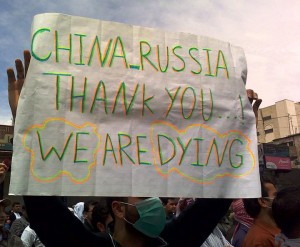 Russia and China joined forces on Tuesday to veto a European-drafted U.N. Security Council resolution condemning Syria and hinting it could face sanctions if its bloody crackdown on protesters continues.
Russia and China joined forces on Tuesday to veto a European-drafted U.N. Security Council resolution condemning Syria and hinting it could face sanctions if its bloody crackdown on protesters continues.
The decision by Moscow and Beijing to use their veto power, Western diplomats told Reuters, could indicate that the Security Council might be headed for a longer-term deadlock on issues related to the Middle East and North Africa, as well as the “Arab Spring” pro-democracy movements in the region.
The draft resolution received nine votes in favor and four abstentions from Brazil, India, Lebanon and South Africa. Russia and China cast the only votes against the resolution, which was drafted by France with the cooperation of Britain, Germany and Portugal.
“We cannot today doubt the meaning of this veto of this text,” French U.N. Ambassador Gerard Araud told the 15-nation council. “This is not a matter of wording. It is a political choice. It is a refusal of all resolutions of the council against Syria.”
“This veto will not stop us,” he added. “No veto can give carte blanche to the Syrian authorities.”
The United Nations says Syrian military operations against demonstrators have killed at least 2,700 civilians.
U.S. Ambassador Susan Rice said Washington was “outraged” by what diplomats said was a “double veto” by Moscow and Beijing, adding that the time had long past for the Security Council to adopt “tough targeted sanctions” on Damascus.
“The crisis in Syria will stay before the Security Council and we will not rest until this council rises to meet its responsibilities,” she said.
British Ambassador Mark Lyall Grant said that he, too, was “deeply disappointed” by the rejection of the resolution.
Regarding Syrian President Bashar al-Assad’s promises of reforms, Lyall Grant said: “There is no sign of reform or a genuine attempt to address the concerns of the Syrian population.”
He later read a joint statement by Britain, France, Germany and Portugal, telling reporters “those who blocked this resolution will have that on their conscience,” and that it was a “bitter blow” to those fighting for democracy in Syria.
NO SUPPORT FROM ‘BRICS’ NATIONS
Russian Ambassador Vitaly Churkin told the council that Moscow’s veto reflected “a conflict of political approaches” between Russia and the European council members.
Churkin said that Moscow was firmly opposed to the threat of sanctions against Damascus, adding that what he described as the confrontational approach of the European delegations was “against the peaceful settlement of the crisis.”
He reiterated his concerns that passing the European resolution on Syria could have opened the door to a Libya-style military intervention in the Syrian authorities’ six-month crackdown on anti-government demonstrations there.
Churkin added, however, that Moscow would prefer it if Syria was “quicker with implementing the promised changes.”
Chinese Ambassador Li Baodong said that Beijing opposed the idea of “interference in (Syria’s) internal affairs.”
Syrian Ambassador Bashar Ja’afari said that the Western powers’ “aggressive” rhetoric against his country had helped him defeat their draft resolution. He also blasted countries for hosting the Syrian “terrorists” opposed to his government.
Ja’afari appeared to be referring to Syria’s neighbor Turkey, which on Tuesday offered refuge in Turkey to a Syrian colonel who joined the revolt against Assad.
Rice and other members of the U.S. delegation walked out of the council chambers during Ja’afari’s speech. Lyall Grant also left while the Syrian envoy was speaking.
For months, Brazil, Russia, India, China, and South Africa — the “BRICS” countries — have criticized the United States and European council members for allegedly allowing NATO to overstep its Security Council mandate to protect civilians in Libya.
No BRICS country supported the Syria resolution. No diplomats had expected Lebanon, which has had a complicated relationship with its neighbor Syria, to support the draft.
The failed resolution was a watered-down version of previous drafts that had threatened Syria with sanctions if it ignored international demands that it halt its crackdown on pro-democracy protesters.
Later drafts removed the word sanctions, though this was not enough to satisfy Russia and China.
Although it voted for the draft resolution, Washington was unhappy with the extent of the compromises the European had made in an attempt to satisfy the BRICS, diplomats said.

Leave a Reply
You must be logged in to post a comment.